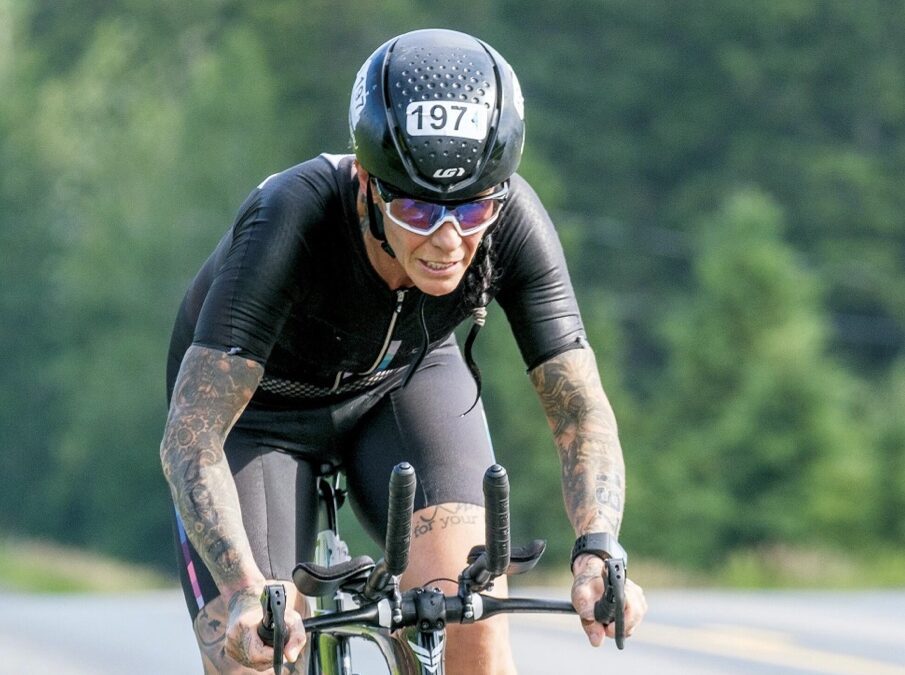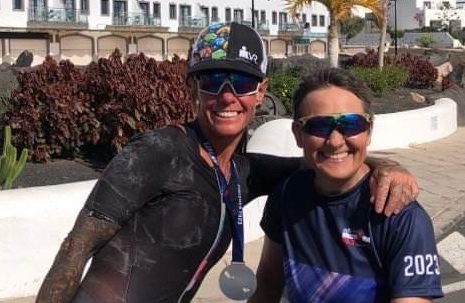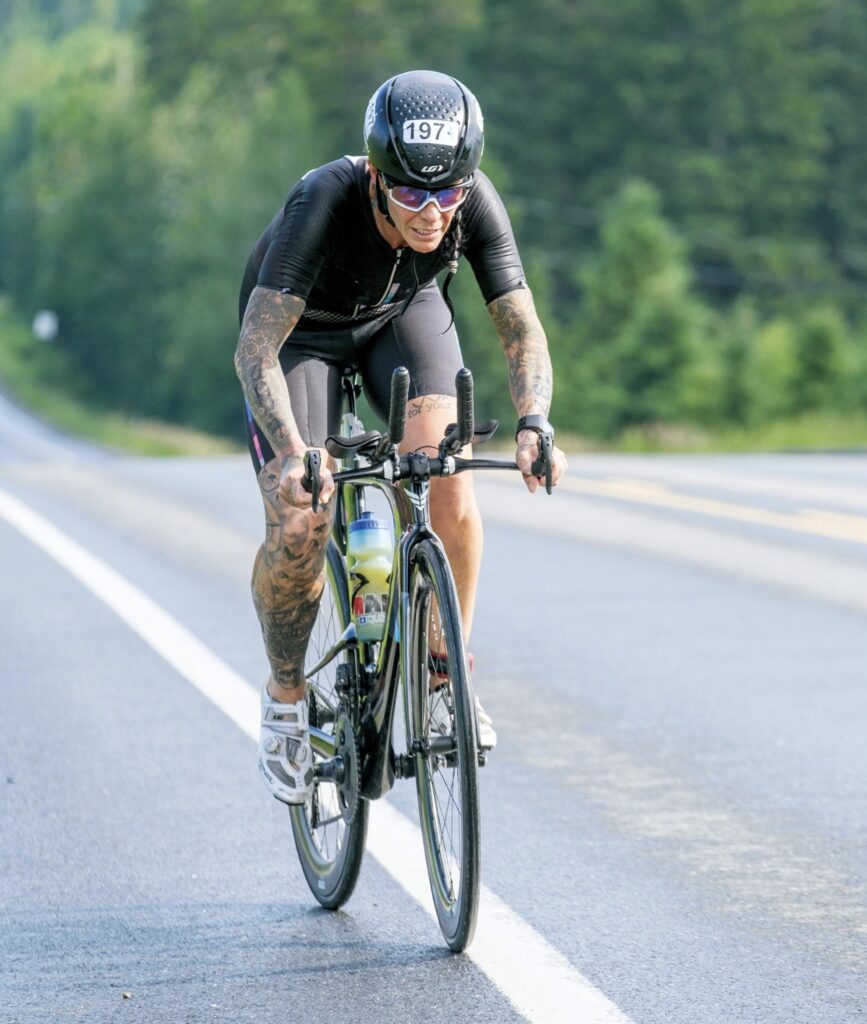From rock bottom to Ironman: “I chose a better addiction”
Christine Piché on the road to recovery
 Photo by:
Michel Caron/ Endurance Aventure
Photo by:
Michel Caron/ Endurance Aventure
My run-walk-run had been reduced to just-keep-inching-forward by the time Christine Piché caught me in the last two km of Ironman 70.3 Lanzarote last March.
“Go, Canada!” I heard her say as she drew up alongside me. “You can do it.”
I tried to match her pace for 40 or 50 metres, energized by her enthusiasm, but I’d been done in by the Canary Islands’ infamous wind on the bike course, and Piché soon pulled ahead — finishing the biggest test of her triathlon career to date near the back of the pack, but proud to have crossed the line with time to spare.
“That was the hardest race I’ve ever done,” Piché confessed when I ran into her soon after in the recovery zone. “But what a good test. Now I have an idea of how much work I still need to do to be ready for Canada Man!”
If you had told Piché a decade ago she’d be laser-focused on preparing for Canada Man/ Woman, the country’s toughest triathlon, this July long weekend, she’d have called you crazy.
She had been through hell and back by then: abandoned by her mother when she was four years old, she’d grown up in youth protection, shuffled from foster home to foster home, sometimes attending four or five schools in a single year. Abused, sexually assaulted, with no trustworthy adult to help instill a moral compass, by her early 20s Piché found herself with the “worst kind of man you can imagine,” literally held captive. It took her nearly five years to escape that violent relationship, and the experience left her responding to the world “like a vicious dog,” she says. Filled with anger and self-loathing, Piché drank herself into oblivion, freebasing cocaine, injecting heroin — there is little she did not do in her desperation to suppress her past.
Then came a day when she couldn’t take it anymore.
“You reach a point where you hit rock-bottom and you have to choose: do I die or do I change my life,” says Piché. She was 38 years old, her body wrecked from booze and drugs and all her misadventures, but she started running — at first, just for the endorphin rush that she craved, and to calm herself down and help her to sleep.
“I chose a better addiction,” she says, laughing. She did her first half-marathon within months of getting sober and a Spartan race not long after that.

Piché is bound by the rules of her recovery program not to share the identity of the person who pointed her in the direction of triathlon, but she feels deeply indebted to him. He, too, is a recovered addict, and he could relate to her story. He helped her understand anything was possible — that she was capable of healing, body and soul.
She ended up in hospital after her first triathlon. She qualified for Kona in her next
In 2015, he took her to Ironman 70.3 Mont-Tremblant, where she watched in awe as triathletes sped through the transition zone. Actually participating in an Ironman seemed unthinkable, but her sponsor suggested she try a sprint, with the goal of working towards a longer race over a few years. Within weeks, Piché had signed up for the sprint in Valleyfield, Que., and the Montreal Esprit, three weeks after that.
“It was a winning recipe,” says Piché. “It allowed me to stay sober through several years of preparation and training. It gave me confidence. It taught me how to take care of myself and how to listen to my body. I also met all kinds of extraordinary people from all walks of life.”

Two years later, in June 2017, she did her first half-Ironman at Mont-Tremblant, followed by her second, at Lake Placid, later the same season.
It hasn’t all been an upward trajectory. Piché has faced enormous setbacks, too. She was struck by a car that pulled out in front of her while training for her first full-distance race in Mont-Tremblant in 2018. She did the Ironman anyway, despite a torn-up shoulder, finishing in 13:34. Doing that race cost her, however: she reinjured her shoulder and had to undergo surgery to repair it. The pain and long recovery time left her despondent — down, but not out. And still sober.
As the pandemic wound down, Piché made another huge life change while she planned her triathlon comeback. An electromechanical technician, she’d been living and working north of the island of Montreal. In February 2022, she took a job at a factory in Lac-Mégantic, retraining as a vibration analysis technician. With her move to the hilly, forested region that hugs Quebec’s border with Maine, Piché set her sights on completing the epic Canada Man/ Woman Xtri race in 2023.
Given five years to live, Patrice Brisindi is making the most of his Ironman race time
Five months after that move, she won the CanadaMan sprint for her age group — her first time at the top of the podium.
“I’m not going to lie,” she says. “It felt great.” She recalled how badly, as a child, she’d wanted to sign up for sports like the other kids. At 47, at last, she had her gold medal.
“It’s those little stars to paste in our notebook,” she muses. “I got a lot of pleasure from that.”
As she shared bits and pieces of her story, Piché dug deep into herself to find the right words to explain just how much triathlon — and triathletes themselves — have meant to her continued recovery.
“I had a huge amount of work to do, to forgive, to find acceptance, to take care of myself, to heal,” she says. “It’s taken a long time. I’m still learning. Every race I do, every day I invest in this discipline, I grow. I learn how to manage the hardships of daily life better.”
There are still hardships, of course. There is still suffering. “But these are trials I’ve chosen of my own accord, and when I put myself through them, it’s with pleasure, with happiness, with joy! I’m happy to be alive,” she says.
“Triathlon has been my school of life,” she concludes. “Plus, I love this sport so much! I love it more and more each year.”
